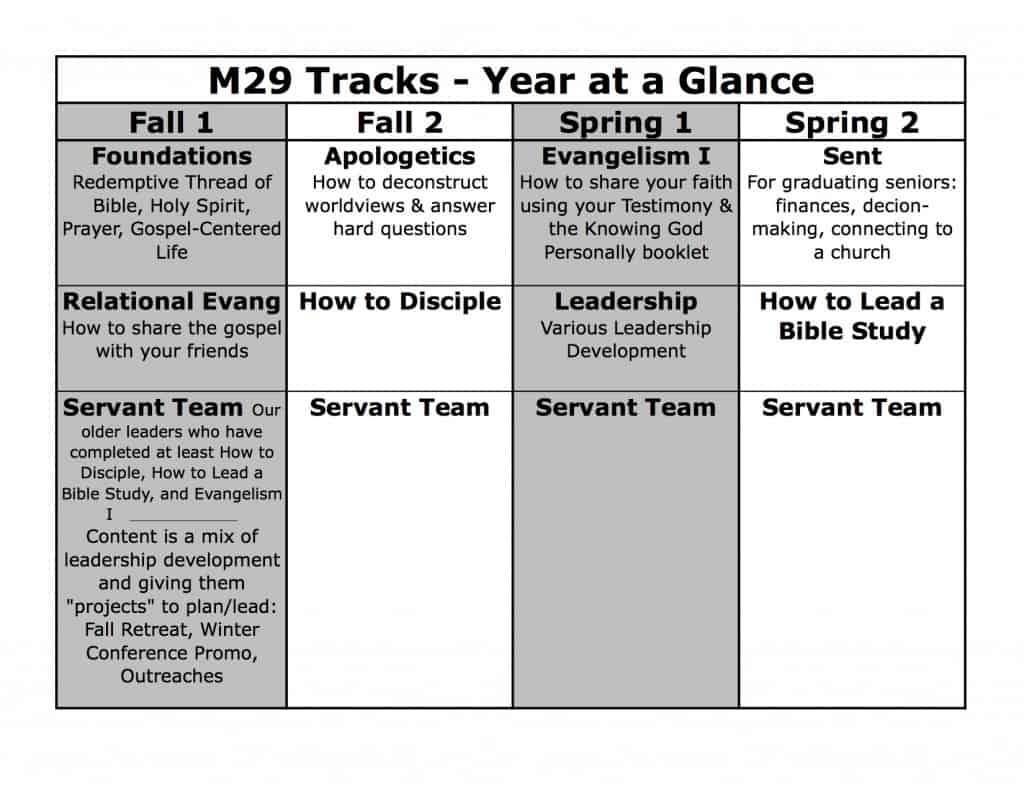 M29 is our weekly Leadership and Training time at the University of Arkansas.
M29 is our weekly Leadership and Training time at the University of Arkansas.
M29 is short for Matthew 29 which is not written in the Bible. As you probably know Matthew 28 ends with Jesus issuing His Great Commission to “Go and make disciples of all the nations”
M29 is our response to the Jesus’ Commission and a desire to write the next chapter of the Great Commission with our lives on the college campus.
M29 is the primary way we equip and train students in evangelism, leading Bible studies, and multiplying their lives
Eventually the M29 material will be on CruPressGreen but I wanted to make it available sooner so you can make use of it in the fall.
We created all of the material and tried to attribute to original sources whenever possible (since very little of this content is original to us).
Feel free to adapt the content for your purposes!
Here are Seven of our Classes:
Click the Title to view files for that class (where you can download each file individually if so desired).
Or click on the Zip file to download the whole folder all at once.
- How to Share Your Faith - zip
- Relational Evangelism - zip
- How to Disciple - zip
- How to Lead a Bible Study -  zip
- Apologetics - zip
- Foundations – zip
- Leadership Development – zip
– the last two classes are probably the weakest content. The other 5 are really good imho : )
 Here’s what our year of M29 training looks like over the course of a year:
 We offer 3 classes at the same time and do 2 6-week sessions each semester.
We offer 3 classes at the same time and do 2 6-week sessions each semester.
Details on what our M29 time looks like:
- We meet weekly on Tuesdays from 6-8 (at a local church)
- The First Hour is called Leadership and is invite-only (which we’ve actually started doing every other week)
- We eat together for the first 20 minutes (bring in food from local restaurants or have donors in the community bring food)
- We rotate through several things in that first hour over the semester but it includes:
- Vision for reaching the campus
- Students sharing what God is doing around campus
- Prayer in small groups
- Time in the Word (devotional in nature)
- Celebrating what God is doing
- Movement-wide alignment/training
- The Second Hour is open to everyone is promoted heavily at Cru
- Second hour is our training/equipping time and we usually have 3 “tracks”/classes going on at the same time (with about 25 people in each)
- Students can pick whichever track they want to go to
- We ask all Leadership students (from first hour) to go to 2nd hour
- We start up tracks about 3 weeks into the semester so we can promote them at Cru
For those that are interested, here’s our thoughts on why we do the tracks when we do them:
The best way of thinking about this is thinking about a potential sharp freshman coming in. They hear about Foundations (which starts the third week of class) at Cru. They get involved, and are grounded in the basics of walking by faith. They then move into Apologetics, as they wrestle with encountering many different worldviews in college and dealing with their own tough questions.
Then they have Evangelism I (in Spring 1), when we get a big influx of people at the beginning of the Spring and from Leadership Retreat where they start to share their faith. As they are challenged to lead community groups, they go into the CG leading track to wrap up the year.
When that group of freshmen comes back in the fall for their sophomore year, Relational Evangelism would be great to sharpen their evangelism skills as they are meeting tons of freshmen and doing tons of follow up and gathering. As their community groups form, they start How to Disciple track, where they learn what to look for in who to disciple and learn how to initiate that process. Naturally, most will challenge people in their groups at the end of the fall before break to consider discipleship in the spring. When they come back in the spring, they would then do Leadership track. After Spring 1, the sophomores (rising juniors) would go into SERVANT TEAM, not Sent. They would come back to do Sent at the end of their senior year (when it is most relevant).
All of the above describes the ideal freshman leader that gets involved. The great thing about the whole structure is that it is completely adaptable to whenever a person gets involved while still having a progression. For example, if a freshmen does not get involved until Fall 2, they go into Apologetics and just continue right along the progression. They can choose at some point to go back to Foundations, or not. Their choice. OR, say a big group of freshmen start in Spring 1. They do Evangelism I, Leading a CG, and then when they come back their sophomore year, go into Foundations or Relational Evangelism.